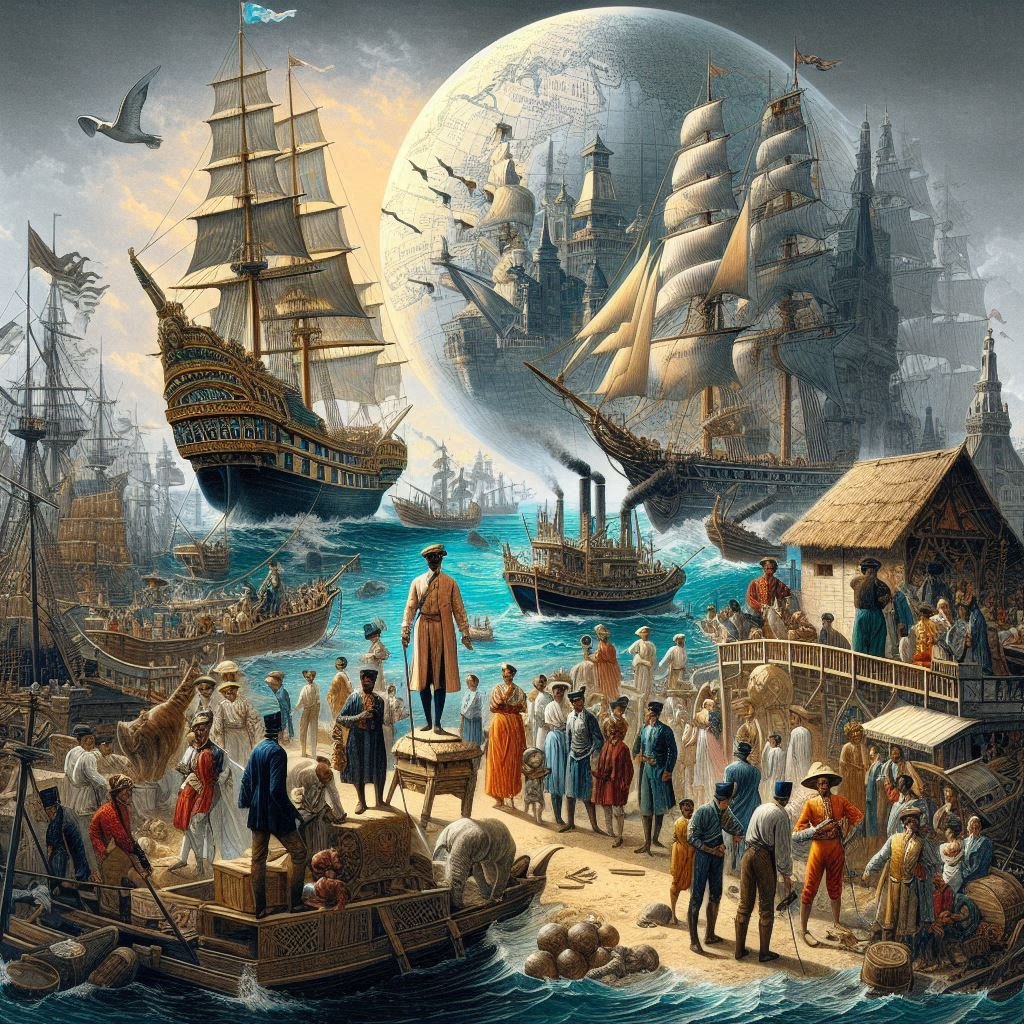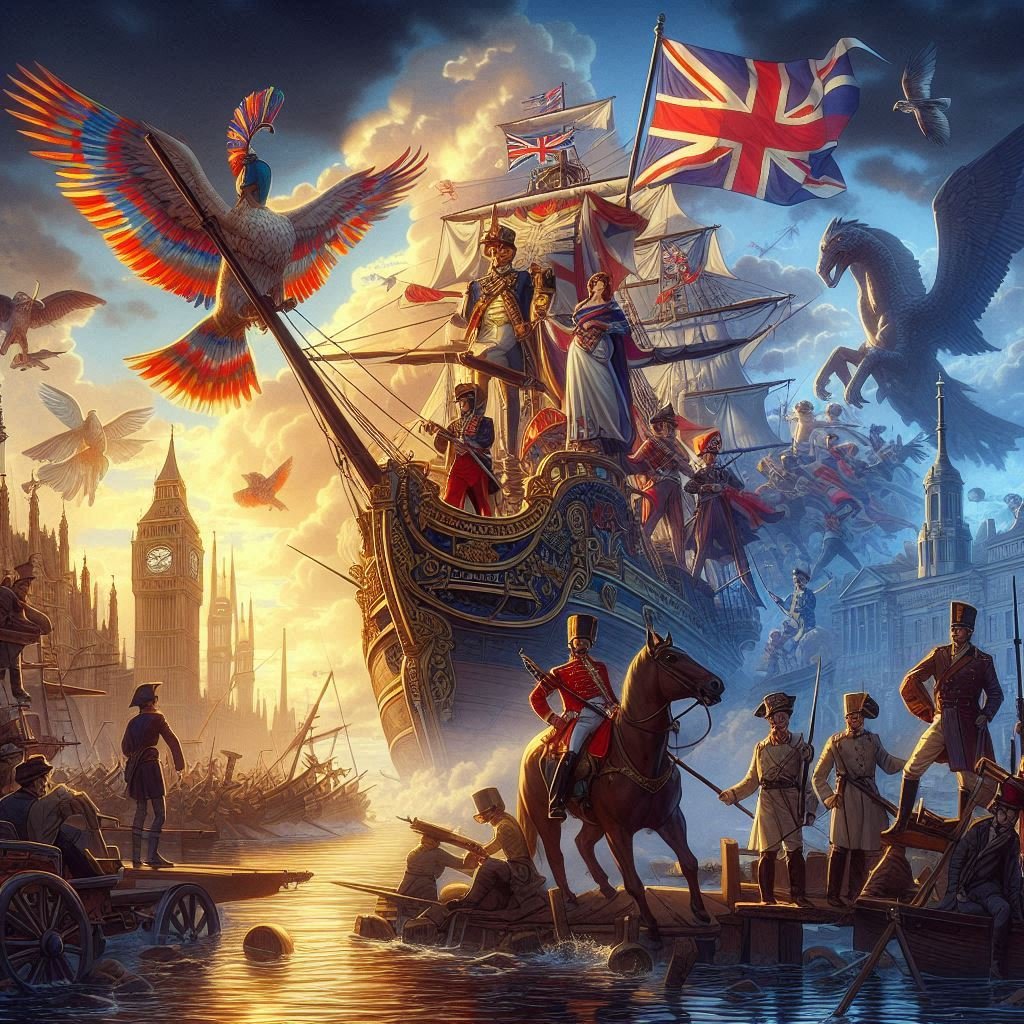Introduction: The Scramble for Power
The Age of Empire (1800 CE – 1914 CE) was a period marked by the rapid expansion of European imperialism. Driven by economic ambitions, technological advancements, and a belief in their own superiority, European powers sought to dominate vast territories in Africa, Asia, and other parts of the world. This era witnessed the rise of colonial empires, as nations like Britain, France, and Germany raced to carve out spheres of influence.
The impact of imperialism was profound, shaping the economic, political, and social structures of the colonized regions. The extraction of resources, forced labor, and cultural suppression characterized European colonial rule. At the same time, resistance movements emerged as local populations fought back against foreign domination, setting the stage for future independence struggles.
The European Powers: Expanding Global Influence
During the 19th century, European countries sought to expand their empires by acquiring territories in Africa and Asia. The British Empire, which by the 1800s had already established control over large parts of India, turned its attention to Africa and Southeast Asia. By the late 19th century, Britain controlled nearly one-quarter of the world’s land area, from Egypt to South Africa to Malaysia.

France also established an extensive empire, particularly in West Africa and Indochina (modern-day Vietnam, Laos, and Cambodia). The Berlin Conference of 1884-85, in which European powers formalized the division of Africa, symbolized the intense competition for territories and the complete disregard for the autonomy of African peoples.
Economic and Political Ambitions: Facts and Figures
| Figures & Facts | Details |
|---|---|
| British Empire in 1913 | Controlled 23% of the world’s population and 24% of its landmass |
| Berlin Conference (1884-1885) | European powers formalized the division of Africa, ignoring African input |
| French Empire (1914) | Controlled approximately 10 million square kilometers of land, mostly in Africa and Asia |
“The sun never sets on the British Empire.” — Popular phrase reflecting Britain’s global reach
Colonial Trade and Economic Exploitation
One of the driving forces behind European imperialism was the desire to exploit the economic resources of colonized regions. European powers extracted raw materials, such as rubber, cotton, diamonds, and gold, from their colonies, sending them back to Europe to fuel the growing industrial economies. In return, they often forced colonies to buy manufactured goods, creating a system of economic dependence that stunted local development.

In Africa, for example, colonial economies were structured around the needs of the European motherland, with infrastructure like railways and ports built solely to serve export industries. Similarly, in India, the British dismantled local industries such as textiles, replacing them with British-manufactured goods. These exploitative practices had a devastating effect on the economic growth of colonized regions, laying the groundwork for long-term poverty and inequality.
“Imperialism is a system of robbery and exploitation masked under the guise of civilization.” — Kwame Nkrumah
Colonial Economics: Facts and Figures
| Figures & Facts | Details |
|---|---|
| Colonial Trade (c. 1900) | Colonial exports made up more than 50% of European imports by the early 20th century |
| India’s Textile Industry | India’s textile industry collapsed under British rule, with raw cotton exported to British factories |
| Rubber Extraction in Congo (late 19th century) | The Congo Free State, under King Leopold II of Belgium, became infamous for brutal labor practices and rubber extraction |
Resistance and Rebellion: The Struggle for Freedom
While European powers expanded their empires, colonized peoples did not remain passive. Across Africa, Asia, and the Middle East, local populations resisted foreign domination through a combination of armed uprisings, civil disobedience, and intellectual movements.

In India, early nationalist movements sought to challenge British rule, with figures like Mahatma Gandhi later leading peaceful resistance. In Africa, resistance was widespread, with famous examples such as the Zulu wars in South Africa and the Mahdist War in Sudan. These movements were often met with violent repression by colonial powers, but they laid the foundation for the independence struggles of the 20th century.
“Freedom is never voluntarily given by the oppressor; it must be demanded by the oppressed.” — Martin Luther King Jr.
Resistance Movements: Facts and Figures
| Figures & Facts | Details |
|---|---|
| Mahatma Gandhi’s Civil Disobedience Movement (1920s) | Advocated non-violent resistance to British colonial rule in India |
| Mahdist War (1881-1899) | Sudanese forces fought against British and Egyptian control |
| Zulu Wars (1879) | The Zulu kingdom resisted British invasion in South Africa, culminating in the famous Battle of Isandlwana |
Cultural Impact: The Clash of Civilizations
The imposition of European cultural values and norms was another hallmark of imperialism. Colonizers often viewed their own culture as superior and sought to “civilize” the local populations by imposing European languages, religions, and legal systems. This led to a clash between indigenous cultures and foreign traditions.

In many colonies, European powers established missionary schools and spread Christianity as part of their civilizing mission. However, indigenous cultural practices persisted, and in some cases, colonized people adopted European ideas and technologies in ways that strengthened their resistance to colonial rule. For example, many African and Asian intellectuals embraced European ideas of liberty and nationalism, using them to justify their own struggles for independence.
Cultural Domination and Adaptation: Facts and Figures
| Figures & Facts | Details |
|---|---|
| Missionary Schools in Africa | European missionaries established schools to spread Western education and religion |
| Spread of Christianity (1800-1900) | Christianity spread widely in Africa and Asia during the colonial period |
| Impact of European Languages | English, French, and Portuguese became the official languages of many former colonies |
Conclusion: The Legacy of Imperialism
The Age of Empire reshaped the world in profound ways. By the early 20th century, European powers controlled vast territories across Africa, Asia, and the Middle East, extracting wealth from these regions to fuel their own development. However, imperialism also sowed the seeds of resistance and nationalism, which would eventually lead to the decolonization movements of the mid-20th century.
While European empires are now a thing of the past, the impact of imperialism is still felt today. The political borders, economic systems, and cultural conflicts in many former colonies can be traced back to this era of conquest and domination.
